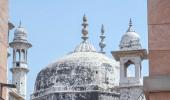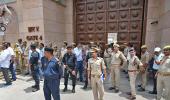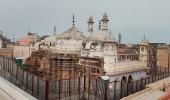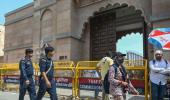Hindu women plaintiffs who have filed a civil suit before the Varanasi court seeking declaration and asserting the right to darshan and worship Hindu deities whose idols are located on an outer wall of the Gyanvapi mosque in Varanasi has referred to stand taken by the British government in a 1936 suit seeking it to be declared as Waqf property.

In an affidavit filed through advocate Vishnu Shankar Jain, three of the five women devotees said that in 1936, one Deen Mohammed has filed a civil suit without impleading any member of the Hindu community but impleading only the secretary of state for India through the district magistrate, Benares, and Anjuman Intajamia Masajid, Benares, for granting declaration that the land bearing situated in the city measuring (1 bigha 9 biswa and 6 dhurs) together with enclosure all-around described in the plaint was Waqf in possession of that plaintiff (Mohammed).
The affidavit has been filed in response to the plea of the committee of management Anjuman Intezamia Masjid which manages the Gyanvapi mosque in Varanasi seeking quashing of the recent survey of the mosque.
The affidavit said that the 1936 suit said that Muslims had the right to say their prayers especially alvida prayers, and to exercise other religious and legal rights as the need and occasion arise.
”It is submitted that the Muslims had filed the above-mentioned suit only for declaration without seeking any consequential relief. This suit was filed even without impleading any person from the Hindu community. Therefore, the judgment passed in the suit is not binding upon any member of Hindu community but any document, map, evidence or statement of any witness can be referred to or relied upon by the members of Hindu community,” the affidavit said.
It referred to a written statement filed in the civil suit on behalf of the secretary of state for India in council refuting the plaint allegations and it was stated that”the idols and the temple which stand there exist since long before the advent of the Mohammedan rule in India''.
The affidavit said that in substance the Government of India (during British era) in the written statement filed in civil suit stated that ''the entire plot of land on which the mosque, ’pucca' courtyard stray grave, staircase in front of the gate, together with ‘pucca' enclosures all around and pipal tree stand belongs to government and has never been dedicated nor could have been dedicated to the mosque.”
It further stated the written statement had said that ”the idols and the temple which stand there have existed since long before the advent of the Mohammedan rule in India. The other allegations made in the said paragraph are denied. It is submitted that the non-Muslims have been using the land for their religious purposes as a matter of right and have got a right of way over it. The allegation that they were permitted by persons in charge of the mosque is unfounded and baseless”.
The affidavit further said it was stated in the statement that ”the land in question was ever stamped with the character of Waqf land. It was never dedicated to god, nor could it have been dedicated and god has no proprietary interest. The Mohammadans of that time or for the matter of that Aurangzeb himself was not the owner of the site in which the old temple of Vishwanath existed and which was demolished by Aurangzeb owing to the religious antipathy, hence it could not have been dedicated according to the true spirit of the Mohammadan faith.”
It further said that the historians have confirmed that Islamic ruler Aurangzeb had issued an order on April 9, 1669, directing his administration to demolish the temple of Lord Adi Vishweshwar (Kashi Vishwanath temple) at Varanasi.
”There is nothing on record to establish that the then ruler or any subsequent ruler has passed any order to create a Waqf over the land in question or for handing over the land to any Muslim or body of Muslims. The copy of firman/order issued by Aurangzeb is reported to be maintained by Asiatic Library, Kolkata”, the affidavit said.
It said that the property in question does not belong to any Waqf and the property had already vested in deity Adi Vishweshwar lakhs of years before the start of the British Calendar year and is continuing to be the property of the deity.
”No Waqf can be created on the land already vesting in a deity. In the historical books written during the Mughal regime and thereafter even Muslim historians have not claimed that Aurangzeb after demolishing the temple structure of Adi Vishweshwar had created any Waqf or thereafter any member of the Muslim community or Ruler was dedicated such property to Waqf,” it said.
The affidavit added that a mosque can be constructed over the property dedicated by a waqif, who should be the owner of the property, and construction raised under the orders of any Muslim ruler or by any Muslim over the land of a temple cannot be construed as a mosque.
The Hindu devotees in the 2021 civil suit said that their plea be decided first by the district judge to whom their case has been transferred on Friday last.
”The religious character of the property has to be determined first before deciding the application filed by the petitioner (mosque committee) herein under Order 7 Rule 11 for proper adjudication of the matter in issue,” it said, adding that the appeal of the mosque committee is not maintainable.










 © 2025
© 2025